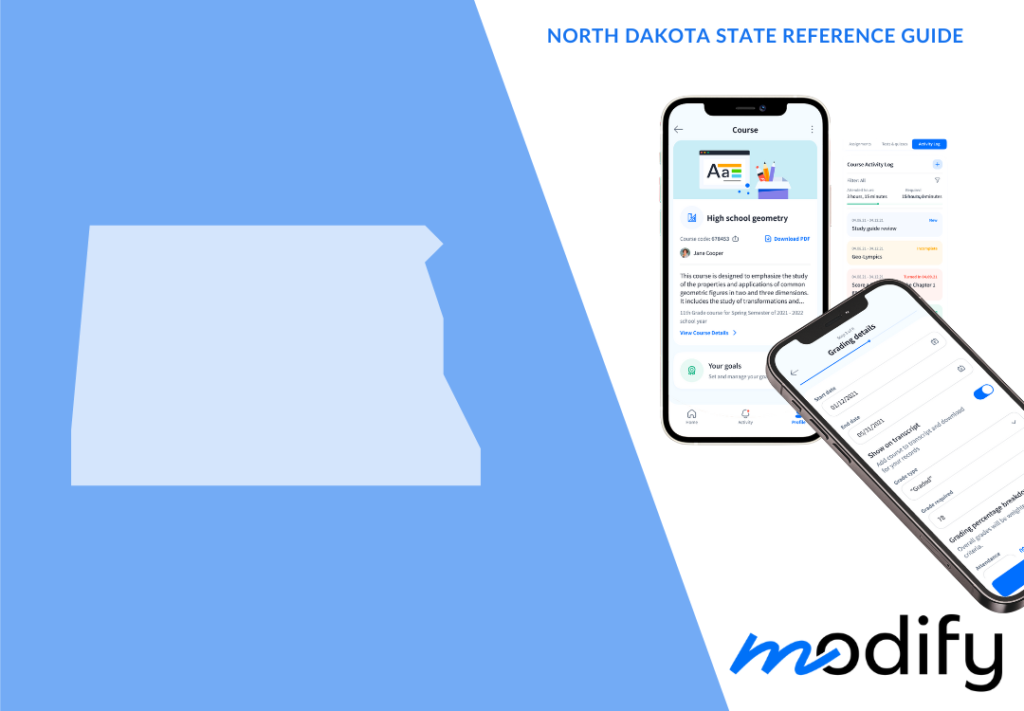North Dakota Homeschool Laws
Homeschooling in North Dakota
How do I start homeschooling?
The steps to homeschooling in North Dakota are:
Meet the teacher qualifications
File a notice of intent to homeschool 14 days before you start every year
Teach for the required amount of time
Teach the required subjects
Choose your preferred homeschool curriculum
Maintain records
Participate in standardized tests in grades 4, 6, 8 and 10
Modify™ can help you with your tracking, portfolio and record keeping. Download the app today.
Enjoying learning together!
Homeschool Laws
According to North Dakota Century Code (NDCC) 15.1-20-01, “Any person having responsibility for a child between the ages of seven and sixteen years shall ensure the child attends a public school for the duration of each school year. If a person enrolls a child of age six in a public school, the person shall ensure the child attends the public school for the duration of each school year. The person may withdraw a child of age six from the public school. However, once the child is withdrawn, the person may not re-enroll the child until the following school year.”
However, per NDCC 15.1-20-02, “The provisions of section 15.1-20-01 do not apply if the person having responsibility for the child demonstrates to the satisfaction of the school board that:
- The child is in attendance for the same length of time at an approved nonpublic school;
- The child has completed high school;
- The child is necessary to the support of the child’s family;
- A multidisciplinary team that includes the child’s school district superintendent, the director of the child’s special education unit, the child’s classroom teacher, the child’s physician, and the child’s parent has determined that the child has a disability that renders attendance or participation in a regular or special education program inexpedient or impracticable; or
- The child is receiving home education.”
To comply with North Dakota’s home education laws, you must follow the homeschool requirements listed in NDCC Chapter 15.1-23. “Home Education” in North Dakota is defined as “a program of education supervised by a child’s parent in accordance with the requirements of this chapter” (NDCC 15.1-23-01).
What do I need to be eligible to be a homeschool parent?
According to the North Dakota Department of Public Instruction, “A parent is qualified to supervise a program of home education if the parent holds a high school diploma or general education diploma (GED)” (NDCC 15.1-23-03). “A parent who does not meet the qualifications provided in section 15.1-23-03 may supervise home education but must be monitored in accordance with section 15.1-23-07 for the first two years” (NDCC 15.1-23-06). A parent may also request that a monitor be provided at the school’s expense.
Per NDCC 15.1-23-01, a parent may be the child’s legal guardian who supervises home education where “supervise” means “the selection of materials, determination of an educational philosophy, and oversight of the method, manner, and delivery of instruction.” According to the North Dakota Department of Public Instruction, “This law gives parents freedom to choose how the child is educated, however it must be noted the parent is still solely responsible for their child’s education.”
Do I need to notify the school district of my intent to homeschool my child?
Yes! “At least fourteen days before beginning home education or within fourteen days of establishing a child’s residence in a school district, and once each year thereafter, a parent intending to supervise or supervising home education shall file a statement, reflecting that intent or fact, with the superintendent of the child’s school district of residence or if no superintendent is employed, with the county superintendent of schools for the child’s county of residence” (NDCC 15.1-23-02).
Per NDCC 15.1-23-02, “The statement must include:
- The name and address of the child receiving home education;
- The child’s date of birth;
- The child’s grade level;
- The name and address of the parent who will supervise the home education;
- The qualifications of the parent who will supervise the home education;
- Any public school courses in which the child intends to participate and the school district offering the courses; and
- Any extracurricular activities in which the child intends to participate and the school district or approved nonpublic school offering the activities.
The statement must be accompanied by a copy of the child’s immunization record and proof of the child’s identity.”
According to the North Dakota Department of Public Instruction, “After receiving the Statement of Intent to Home Educate (SFN 16909), the local superintendent will:
- Inform the parent about parental responsibility to maintain the student’s academic record for each home-educated student.
- Explain resources and support for students who are experiencing learning difficulties and who may need special education and related services, as well as the responsibility of the local school district to identify and appropriately serve such students.
- Provide the local school district’s expectations for each student at the appropriate grade level in the subjects required by statute.
- Provide information regarding the standardized achievement test administered by the district and the parent’s options regarding the test.
- Provide a copy of the state law on home education.”
What educational options are available to my homeschooler?
“The 2019 Home Education version of the Century Code clarifies that a parent may choose any way they see fit to educate their child. This may be virtually, through independent classes, work study, public school, etc.” (North Dakota Department of Public Instruction). Based on the State Superintendent letter dated January 14, 2014, “a home educated student may open enroll to a non-resident school district for the purpose of participating in academic courses” (2014-L-01).
Homeschool Requirements
Even though North Dakota does not highly regulate homeschooling, there are some North Dakota homeschool requirements you must satisfy when you homeschool:
- Begin homeschooling by age 7.
- File the required Statement of Intent fourteen days prior to beginning homeschooling and each year thereafter (NDCC 15.1-23-02).
- Include “instruction in those subjects required by law to be taught to public school students” (NDCC 15.1-23-04).
- Provide instruction for “a duration of at least four hours each day for a minimum of one hundred seventy-five days each year” (NDCC 15.1-23-04).
- Arrange for testing using a nationally-normed standardized achievement test in grades four, six, eight, and ten.
- Stay current with homeschooling laws and requirements.
Do I need to administer testing to my homeschooler?
North Dakota Century Code states, “While in grades four, six, eight, and ten, each child receiving home education shall take a standardized achievement test used by the school district in which the child resides (All school districts in North Dakota are required to take the NDSA which is a criterion-based test). The NWSA will fulfill the testing requirement for home educated students. If the parent does not wish to have their child take the NDSA, they will be required to take a nationally normed standardized achievement test of their choice and submit the test scores, including the composite score, to the superintendent or county superintendent if the district does not employ a superintendent” (North Dakota Department of Public Instruction).
“If the child takes a nationally normed standardized achievement test not used by the school district in which the child resides, the child’s parent is responsible for the cost of the test. In addition, the cost of administering a test is the responsibility of the child’s parent if the test is administered by an individual who is selected by the parent. An individual selected by the child’s parent to administer a test must be licensed to teach by the education standards and practices board or approved to teach by the education standards and practices board. The cost of administering a test is the responsibility of the school district if, at the request of the child’s parent, the school district administers the test. The school district shall ensure that the test is administered by an individual who is employed by the district and who is licensed to teach by the education standards and practices board or approved to teach by the education standards and practices board” (North Dakota Department of Public Instruction).
There are, however, exemptions to this requirement. Per NDCC 15.1-23-09, the testing requirement “does not apply if the parent notifies the school district in which the child resides that the parent has a philosophical, moral, or religious objection to the use of standardized achievement tests or the parent:
- Is licensed to teach by the education standards and practices board or approved to teach by the education standards and practices board;
- Holds a baccalaureate degree; or
- Has met or exceeded the cutoff score of a national teacher examination given in this state or in any other state if this state does not offer such an examination.”
What happens to my child’s annual testing results?
The North Dakota Department of Public Instruction provides the following information: “If the child’s basic composite score on a standardized achievement test is less that the thirtieth (30%) percentile nationally, a multidisciplinary assessment team shall assess the child for a potential learning problem under rules adopted by the superintendent of public instruction. If the multidisciplinary assessment team determines that the child is not disabled and the child’s parents wish to continue home education, the parent, with the advice and consent of an individual who is licensed to teach by the education standards and practices board or approved to teach by the education and standards practices board, shall prepare a remediation plan to address the child’s academic deficiencies and file the plan with the superintendent of the school district or with the county superintendent if the district does not employ a superintendent. The parent is responsible for any costs associated with the development of the remediation plan. If the parent fails to file a remediation plan, the parent is deemed to be in violation of compulsory school attendance provisions and may no longer supervise the home education of the child.
The superintendent of the school district shall use the remediation plan as the basis for determining reasonable academic progress. The remediation plan must remain in effect until such time as the child achieves on a standardized achievement test a basic composite score at or above the thirtieth (30%) percentile or a score, which when compared to the previous year’s test score, demonstrates one year of academic progress. At the option of the parent, the test may be one required or one administered in a higher grade level. The child’s parent, with the advice and consent of an individual who is licensed to teach by the education standards and practices board or who is approved to teach by the educations standards and practices board, may amend the remediation plan from time to time in effect the child fails to demonstrate reasonable academic progress on a subsequent test, a remediation plan must again be developed and implemented.”
“If a child receiving home education obtains a basic composite standardized achievement test score below the fiftieth percentile nationally, the parent must be monitored for at least one additional school year and until the child receives a test score at or above the fiftieth percentile. If testing is not required by section 15.1-23-07 during the first two years of monitoring, the period of monitoring may not be extended, except upon the mutual consent of the parent and the monitor. If a parent completes the monitoring requirements of this section for one child, the parent may not be monitored with respect to other children for whom the parent supervises home education” (NDCC 15.1-23-06).
What records do I need to keep when I homeschool my child?
According to NDCC 15.1-23-05, “A parent supervising Home Education shall maintain an annual record of courses taken by the child and the child’s academic progress assessments, including any standardized achievement test results.” Also, “it is recommended from the North Dakota Home School Association (NDHSA) and the North Dakota Department of Public Instruction (NDDPI) that a parent maintain meticulous records of both classes taught and standards met during these classes. These records will be helpful to the parents for multiple reasons, including:
- If the student transfers to a public school;
- Filling out college applications and scholarships; and
- Resources for educating younger children in the household.”
In addition to the required recordkeeping, we also recommend you do some personal recordkeeping to provide verification of education in the event you would need to show some form of educational proof to the state or other legal entities or to prepare for re-entry into public school or postsecondary pathways. This includes the following:
- Attendance
- Immunization records
- Lists of texts and workbooks used
- Student schoolwork samples and/or portfolios
- Test and evaluation results
- Correspondence with school officials
You may also be able to find more information on North Dakota homeschool requirements through your local school district.
Record Keeping
In North Dakota, homeschooling families are required to maintain academic records of their students. Here’s a list of what should be kept on file:
- Courses taken by the child
- Child’s academic progress assessments
- Standardized achievement test results
- Other records relating to the instructional and educational activities
An organized record keeping system will prove helpful in times of educational transition or when preparing for college applications. Most parents keep records with a homeschool portfolio to showcase their child’s growth and progress throughout their journey.
The Modify™ app makes record keeping simple and keeps all your records organized.
Graduation requirements
North Dakota is one of the few states that issues high school diplomas to homeschooled students. Since homeschools are regulated at the district level, high school diplomas will be issued by the corresponding school district of the child’s residence, an approved nonpublic high school, or the center for distance education. Parents must submit the following in order to obtain a diploma:
- Description of course material covered by high school subject
- Description of course objectives and how they were met
- Transcript of performance in grades 9-12
- Any other reasonable proof deemed appropriate by the entity granting the diploma that shows your child has completed requirements for high school graduation
Alternatively, submitting the above documentation, with completion of at least 22 units of high school coursework, may result in the issuance of a high school diploma, which may include an indication that the child was provided home education. Full details can be found on the Legislature site.
Modify™ helps homeschoolers to keep all necessary records and transcripts.

REFERENCE GUIDE:
North Dakota Century Code (NDCC) 15.1-20-01
NDCC 15.1-20-02
NDCC Chapter 15.1-23
Statement of Intent
Note: All information on this site is provided with no guarantee of accuracy. Modify™ is not responsible for any errors, omissions, or outdated information, or for the results yielded through use of this information.





